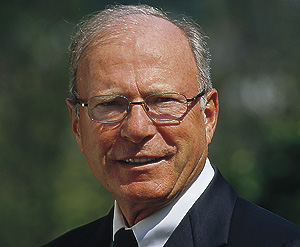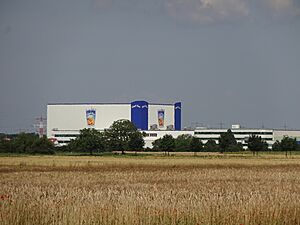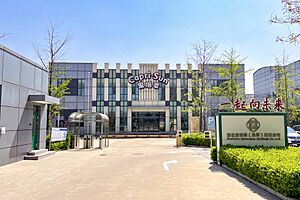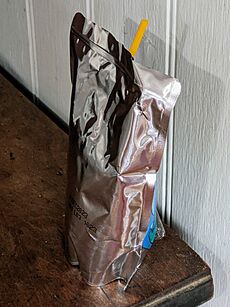Capri-Sun facts for kids
 Primary logo  Logo used by Kraft in North America |
|
| Type | Juice drink |
|---|---|
| Manufacturer | Capri Sun Group (Wild), with other companies like Kraft making it in different regions. |
| Country of origin | Germany |
| Introduced | 22 June 1969 (as Capri-Sonne) |
Capri-Sun is a brand of juice drinks that is famous for its shiny silver pouch. It was first made in Germany in 1969 by a company called Wild. The drink was invented by Rudolf Wild and was originally named Capri-Sonne.
Today, Capri-Sun is sold in over 100 countries. Different companies have the license, or permission, to make and sell it in different parts of the world. For example, Kraft Foods makes it in the United States, where it is called Capri Sun. It is one of the most popular juice brands in the world, selling about 6 billion pouches every year.
The drink is best known for its special pouch, which is made of a thin, flexible foil. When it first came out, most juice was sold in large cans, so this single-serving pouch was very new and different. The design of the pouch has mostly stayed the same over the years.
Capri-Sun comes in many different flavors, and the most famous one is Orange. The amount of sugar in the drinks has been a topic of discussion. Some people felt the drinks had too much sugar to be called "all-natural." This led to some changes in the recipes and how the drinks are advertised.
The Story of Capri-Sun
How It All Began
In 1931, a man named Rudolf Wild started a company in Heidelberg, Germany. His company made ingredients for food. In the 1960s, he came up with the idea for a new juice drink. He decided to package it in a special pouch that he got the rights for from a French company.
The drink was launched in West Germany in 1969. It was named "Capri-Sonne," which means "Capri Sun" in German. The name was inspired by the Italian island of Capri. In the 1960s, Capri was a popular and sunny vacation spot for many Germans.
Becoming Famous Worldwide
The drink became much more popular in 1978, thanks to the help of champion boxer Muhammad Ali. He appeared in ads saying that Capri-Sonne was "the greatest of all time," just like him. This made sales go up a lot. By 1982, Capri-Sun was the most popular fruit juice in 19 of the 23 countries where it was sold.
The brand is owned by the Wild family's company in Germany, but they license it to other companies to produce and sell around the globe. This means that while the main recipe comes from Germany, the Capri-Sun you drink might be bottled in a factory closer to your home.
Capri-Sun in Europe
Although Coca-Cola's companies started making Capri-Sun in the United Kingdom in 1994, the drink was available to buy from the mid 1970s onwards. Capri-Sun was also introduced to France in 2007, where it quickly became very popular.
For a long time, Germany was the only country that still called the drink by its original name, Capri-Sonne. In 2017, the company decided to change the name to Capri-Sun everywhere to make the brand the same all over the world.
In 2023, the Capri Sun Group announced it would take over selling the drink in many European countries, including the United Kingdom, France, and Spain.
Capri-Sun in North America
Capri Sun first came to the United States in 1979. At the time, most juice was sold in large cans, so the single-serving pouch was something new for American families. The pouch was light, durable, and easy to pack in a lunchbox.
In 1991, Kraft General Foods bought the rights to sell Capri Sun in the United States, Canada, and Mexico. Kraft used its experience to create fun and colorful advertising. The ads often showed kids having fun at the beach, which made the drink seem cool and exciting.
Kraft also started including Capri Sun in its Lunchables meal kits. These marketing ideas were very successful and helped make Capri Sun one of the most popular drinks for kids in America.
Africa and Asia
Capri-Sun has factories in many other parts of the world. A factory was opened in Nigeria in 1980. The drink also became available in China in 2005 and is now made in a large factory in Beijing.
Factories in other countries, like India and the French island of Réunion, help bring Capri-Sun to people all across Asia and Africa.
All About the Products
Flavors Around the World
There are many different Capri-Sun flavors, and they can change from country to country to match what people like there. For example, flavors sold in Mexico might be sweeter than flavors sold in Germany.
The most famous flavor worldwide is Orange. In the United States, some of the most popular flavors include:
- Fruit Punch
- Pacific Cooler
- Strawberry Kiwi
- Wild Cherry
Different Types of Capri-Sun
Besides the original juice drink, Capri-Sun also makes other kinds of drinks.
- No Added Sugar: These versions are sweetened with other ingredients, like stevia, instead of regular sugar.
- 100% Juice: A line of drinks made with only fruit juice and no extra sugar.
- Roarin' Waters: A line of lightly flavored water.
- Organic: Made with organic ingredients.
Questions About Sugar
Because Capri-Sun is a sweet drink, there have been discussions about its sugar content. In the past, the company advertised the drink as "all-natural." However, some people felt this was not accurate because of the amount of sugar.
This led to a lawsuit in the United States. Afterward, Kraft stopped using the "all-natural" label and started using phrases like "no artificial colors, flavors, or preservatives." Over the years, the company has also created new recipes with less sugar. In 2022, they started using monk fruit concentrate, a natural sweetener, to reduce the sugar in their main drinks by almost half.
The Famous Pouch
The pouch is a key part of what makes Capri-Sun special. It is made of thin layers of aluminum and plastic, which keeps the drink fresh without needing to be refrigerated.
Keeping the Drink Fresh
The pouches are very strong, but if a tiny, hard-to-see hole gets poked in one, mold can sometimes grow inside. This is a natural process that can happen with any food product that doesn't have preservatives.
To help people see that their drink was fresh, Kraft introduced pouches with clear bottoms in 2014. This allowed customers to see the juice inside. A few years later, the company switched back to the all-foil pouch because of problems getting the materials needed to make the clear-bottom version.
Recycling the Pouch
The way the pouch is made with different layers makes it difficult to recycle in most regular recycling bins. Environmental groups have pointed out that many pouches end up as litter.
In some countries, there are special programs to recycle the pouches. For example, a company called TerraCycle collects used pouches and turns them into new products like bags and pencil cases. In Germany, the company pays for a recycling system to handle the used pouches.
Popularity and Impact
Capri-Sun is very popular with young people. A 2022 survey found that it was one of the most-liked brands among Generation Z (people born between the late 1990s and early 2010s).
Health experts often remind people that even though Capri-Sun has fruit juice, it is a sugary drink. They suggest that drinks like it should be an occasional treat rather than an everyday drink. Many parents choose Capri-Sun for their kids, and the company has created lower-sugar options to provide healthier choices.
 | Dorothy Vaughan |
 | Charles Henry Turner |
 | Hildrus Poindexter |
 | Henry Cecil McBay |






